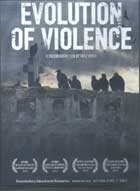
Evolution of Violence/ Evolution Der Gewalt 2011
Distributed by Documentary Educational Resources, 101 Morse Street, Watertown, MA 02472; 617-926-0491
Produced by Oliver Neumann, FreibeuterFilm KG
Directed by Fritz Ofner
DVD, color, 77 min.
Jr. High - General Adult
Latin America, Human Rights, Activism, Nationalism, Protest, Democracy, Guatemala, Violence, Capitalism
Date Entered: 05/22/2014
Reviewed by Malcolm L. Rigsby, Department of Sociology and Human Services, Henderson State University, Arkadelphia, ArkansasOften in debate is the issue of the role of nongovernmental organizations and foreign governmental powers in the affairs of other countries. Guatemala is a land typically labeled a “banana republic”; a land where politics shore up foreign interests in exportable goods and those that seek rights “disappear”. The film delves into the question of the effect of globalization; both its political and economic tendencies on developing nations. The question arises whether globalization is overwhelmingly justified because it provides manifest functions that outweigh dysfunctional outcomes, or is globalization simply a means for those with power and authority to maximize gains at the expense of a population that is managed like a herd of cattle. As the film demonstrates, whether dysfunctional outcomes or purposeful exploitation, the disruption of a people’s understanding of trust, their own value and belonging has long term effects on their reality of life. Perhaps a resounding statement made in the film is “I think what we must see is what 36 years of war has meant for Guatemala…it has created a very strong culture of death. Here security forces were taught to torture, kill and rape as part of the political repression against the opposition…this was made easy started by parliamentary death squads regarding certain segments of society, for example, business organizations.” This legitimatized violence as a means to deal with conflict. Ironically the news reporter Rolando Santiz, who states early on in the documentary that violence is a “way of life” and “you get used to it” is later murdered.
The film points out that the root of this legitimized culture of violence is embedded in the relationship between powerful state political figures and capitalistic ventures of colonial powers. Guatemala is one example of the linkage between colonial ventures such as United Fruit and powerful war lords who abused citizens of this and similar Banana Republics. The film points out that the export of fruits and petroleum products and the like have led to leagues between NGOs and local politics to the detriment of the common people. It was Che Guevara that helped spur the people to fight against these abuses. It was Guevara that said “Our every action is a battle cry against imperialism, and a battle hymn for the people’s unity…”
With the situation of non-trust, the people suffering the daily violence in their lives don’t know where to turn for assistance. This film offers one medium for making the world aware of the abuses taking place in Guatemala. But just as critical it uncovers the dysfunctions and tensions created for an indigenous and underprivileged population when world powers seek to bring unregulated and or self-serving changes to the developing country. One thing that the film seems to convey is that one foundation for people to reconnect their culture, history and control of their own lives is to reestablish their own identity and self-respect and in turn give them “voice.” This helps build self-determination about their collective future.
The documentary is a bit slow moving in the first 15 minutes. However, if the viewer will be patient in wading through all of the death scenes they will be rewarded. It is this first 15 minutes that set the stage and call for the viewer to become active in the people’s fight for respect, dignity and social humanitarian justice. The substance of this documentary gives voice to the people of Guatemala, but is more expansive in that it calls for the viewer to consider these issues in all developing nations of the world. The concepts are transferable to North Africa, Afghanistan, Palestine, Eastern Europe and Asia. Excellent editing provides a very logical flow as Ofner presents his case for reform of and safeguards against discriminate use of globalization by NGOs and powerful western nations. Film Trailer sponsored Trailer via YouTube.